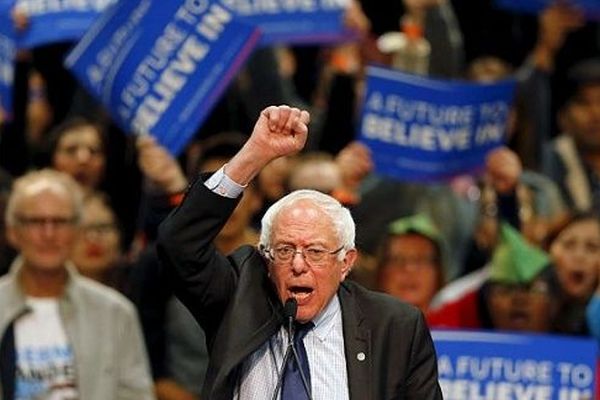
Sanders won a U.S. House of Representatives seat in 1990, making him the first independent elected to the House in 40 years
United States Senator Bernie Sanders, the progressive populist who mounted a fierce challenge to front-runner Hillary Clinton in the 2016 presidential campaign, said Tuesday he would again seek the Democratic Party’s presidential nomination in 2020.
Sanders, 77, announced his candidacy in a lengthy early morning email to supporters, pledging to build a vast grassroots movement to confront the special interests that he said dominate government and politics.
“Our campaign is about creating a government and economy that works for the many, not just the few,” Sanders said in the email, asking for 1 million people to sign up to start the effort.
The senator from Vermont launched his insurgent 2016 candidacy against Clinton as a long shot, but ended up winning 23 state primary contests and pushing the party to the left, generating tension between its establishment and liberal wings that has to now still not entirely abated.
This time around, Sanders has been among the leaders in opinion polls of prospective 2020 candidates, but he faces a field more heavily populated with other liberal progressives touting many of the same ideas he brought into the party mainstream. That could make it harder to generate the same level of fervent support as four years ago.
He also is likely to face questions about his age and relevance in a party that is increasingly advancing more diverse and fresh voices, including those of women and minorities — groups that Sanders struggled to win over in 2016.
The primaries and caucuses that determine the party’s nominee begin in February 2020 in Iowa, and the Democratic winner is likely to face President Donald Trump, a Republican, in the general election in November.
Sanders has been an unsparing critic of Trump, and in his email he called him “the most dangerous president in modern American history.”
“We are running against a president who is a pathological liar, a fraud, a racist, a sexist, a xenophobe and someone who is undermining American democracy as he leads us in an authoritarian direction,” Sanders said.
Among those already in the Democratic race are fellow Senators Cory Booker of New Jersey, Kamala Harris of California, Kirsten Gillibrand of New York, Amy Klobuchar of Minnesota and Elizabeth Warren of Massachusetts.
“Together, you and I and our 2016 campaign began the political revolution. Now, it is time to complete that revolution and implement the vision that we fought for,” Sanders said in his email to supporters.
Sanders, a political independent and democratic socialist who caucuses with Democrats in the Senate, said he would push in his campaign for many of the same issues that powered his 2016 bid and resonated with younger voters, including universal healthcare, raising the minimum wage, and free public college tuition.
“Three years have come and gone. And, as a result of millions of Americans standing up and fighting back, all of these policies and more are now supported by a majority of Americans,” he said.
A former mayor of Burlington, Vermont, Sanders won a U.S. House of Representatives seat in 1990, making him the first independent elected to the House in 40 years. In 2006, he won a U.S. Senate seat and in 2018 was voted in for a third six-year term.
His push against Clinton, a former first lady, U.S. senator and secretary of state, was notable because few Democrats seemed inclined to challenge her claim on the nomination. Sanders’s candidacy swiftly became a phenomenon, as he spoke to swelling crowds and garnered passionate support on social media.
Unlike Clinton, he refused to take money from corporate political action committees, or PACs, relying on a flood of small-dollar donations.
When he ultimately conceded and spoke at the Democratic National Convention in support of Clinton, some of his supporters booed. At the time, Sanders said his populist platform would endure.
 Escambray ENGLISH EDITION
Escambray ENGLISH EDITION





Escambray reserves the right to publish comments.